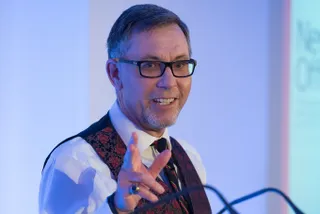
The Misuse Of Personal Data and Security Risks | A Q&A with Cyber Security Expert and Futurist Simon Moores
In a world of rapid technological innovation, digital strategist and security futurist Simon Moores provides fascinating insights into the future of business. Lucky for us, he took some time out of his busy diary to have a chat about data protection, cyber security, and the potential implications for the market and society.
In the wake of the Cambridge Analytica scandal, what more can be done to prevent our personal data being misused?
If I’m completely frank, very little. In Europe, we now have the GDPR, but this only skims the surface and can only sanction businesses that fall within its reach. The FT reports that over 80% of UK companies have now been victims of one kind of cybercrime or another, so your data may already have been lost. This is a much bigger discussion and a first step is that businesses must be awake to the risks and be taking proactive steps to deal with the threat and the reputational damage that accompanies it. Think TalkTalk, Carphone Warehouse, Wonga, British Airways and many more. Never underestimate the determination of hackers to get at financial details - in their eyes, companies that deal with customers financial details are like banks with poor security.
It is thought by some that it is near impossible for governments to legislate fast enough and keep up with the exponential rate of technological innovation. You’ve seen the inner workings of the government, working with them on internet policy and digital plans, how can they keep a handle on this unprecedented advancement of tech and the impact it has on our society?
The slow and reactive nature of Government is a problem. I recall a conversation in Cabinet Office in 2001, where I worried over the threats that might accompany the introduction of widespread domestic broadband, only to be told that Government was confident that industry would fix the problem with the internet long before then. It didn’t.
This month I was speaking at an event hosted by Barclays bank. One of the bank’s slides took me by complete surprise. The graph showed that in 2014 attempts to commit online fraud went from a steady background hum and became a rocket launch to Mars. Something profound had happened for several reasons I won’t dive into here other than saying that both criminal opportunity and technology have converged in ways that the criminals and organised crime had never imagined throughout the course of human history.
Government is trying hard as is every government in Europe but the scale of the problem being facilitated by the internet is now too large for anything but isolated victories and successes against both a global pandemic of organised crime and the impact and darker influence of social media on our society, which is another story altogether.
"State-sponsored hacking is a threat to us all."
Should we be worried about the drive towards online espionage and state-sponsored hacking?
We now have Russians on Twitter, Iranians on Facebook, and Chinese on LinkedIn. What a time to be alive! State-sponsored hacking is a threat to us all, whether this is directed towards the destruction of our democratic process or the theft of our personal information.
As the threat level rises, how can businesses build stronger resilience in the face of a cyber-attack?
There’s a short answer and there’s a long answer to this question. The latter is woven into one of my talks. However; there is a single point I wish to stress which is that businesses have become information processing systems and increasingly, that's all they are. Criminals are finding new ways of breaching the ‘end-point’ of an organisation, wherever that may exist, physically or virtually, as more applications migrate to the cloud or find their way on to mobile devices. Closing that gap is one of the biggest challenges now confronting any business CISO who wants to enjoy a good night’s sleep.
What key messages do you like to leave audiences with?
If it’s a talk focused on cybersecurity, then it’s the question we should ask of our trust and security systems. Not how they work but why they fail and whether this persistent catalogue of failure can be reversed?
If it’s a talk on the future, then I would say that our intuition has been formed by a set of experiences and ideas about how things worked during a time when changes were incremental and somewhat predictable.
Making an assumption, that progress is both slow and linear is a dangerous one to make and plain wrong.
Thanks so much for chatting with us Simon.
We were terribly saddened to hear Simon passed away on Wednesday 09 January 2019. We thoroughly enjoyed working with Simon and our deepest sympathies are extended to his family.
Newsletter Sign Up
If you liked this article then why not sign up to our newsletters? We promise to send interesting and useful interviews, tips and blogs, plus free event invites too.
Have an enquiry?
Send us a message online and we'll respond within the hour during business hours. Alternatively, please call us our friendly team of experts on +44 (0) 20 7607 7070.
Related speakers
| Agile Development by Byte9
